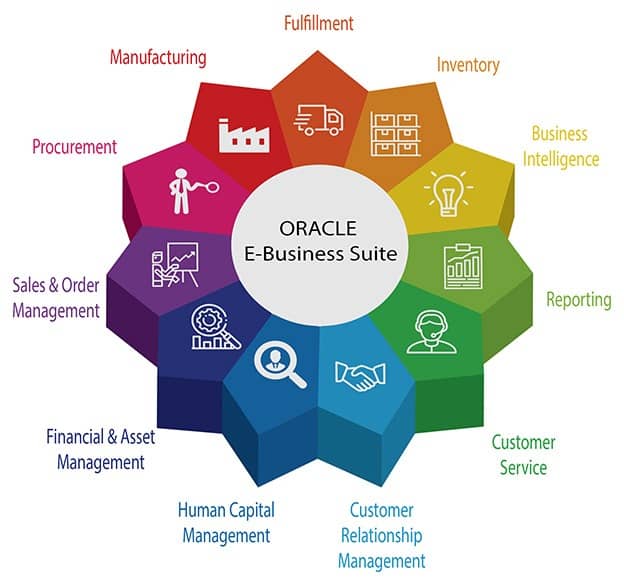Oracle E-Business Suit
Oracle E-Business Suite (EBS) is a comprehensive suite of business applications provided by Oracle Corporation. It is a set of integrated business applications that empower organizations to make better
decisions, reduce costs, and increase performance.
Here are some key details about Oracle E-Business Suite for updating your website:
Overview:
Oracle E-Business Suite is an enterprise resource planning (ERP) software suite that includes various modules and applications designed to streamline business processes. It covers areas such as finance, human resources, supply chain management, procurement, project management, customer relationship management (CRM), and more.

Method and Approach to Achieve Excellence through Custom Solutions
Our key goal at Burkitech is satisfying our customers. Our approach marries industry best practices and Oracle EBS know-how to deliver customized solutions that enable business change. With deliberate planning and intentional execution, we get the most out of your Oracle EBS system and ensure its long-term success by upgrading, migrating, or re-implementing it.
Challenges to Success
Oracle EBS can be challenging to operate because of inefficiencies, integration problems with the system, migration issues with the data, and performance bottlenecks. Our experts work towards overcoming these limitations by resolving essential issues that compromise business while boosting system performance, automating processes, and reducing downtime – optimizing your system for optimal performance.
Data Engineering Boosts Decision-Making
Effective decision-making is the heart of business success. With Oracle EBS and sophisticated data engineering, Burkitech assists businesses in converting a mess of information into insights that enable better decision-making, process optimization, and expansion. With real-time data analysis services.
Modules and Applications
Oracle EBS comprises a wide range of modules, including but not limited to:
Financial Management: Handles accounting, financial planning, budgeting, and more.
Human Capital Management (HCM): Manages HR functions, payroll, workforce planning, and talent management.
Supply Chain Management (SCM): Covers inventory management, order processing, procurement, and logistics.
Customer Relationship Management (CRM): Focuses on sales, marketing, and service automation.
Procurement: Manages procurement processes and supplier relationships.
Key Features
Integration: Oracle EBS provides seamless integration across various business functions, enabling real-time data sharing and collaboration.
Customization: It allows for customization to align with specific business needs and industry requirements.
Scalability: EBS is scalable and can adapt to the changing needs and growth of an organization.
Reporting and Analytics: Provides robust reporting and analytics capabilities to derive insights and make data-driven decisions.
Benefits
Improved Efficiency: Streamlines business processes, enhances productivity, and reduces manual efforts.
Enhanced Visibility: Provides real-time visibility into operations, enabling better decision-making.
Regulatory Compliance: Helps in maintaining compliance with regulatory standards and guidelines.
Cost Savings: Optimizes resource utilization and operational costs.
A Three-Phase Solution
Our three-phase method ensures fast and uninterrupted delivery for your Oracle EBS migration initiative, which has already proven successful.
Assessment and Strategy
- Current System Review: Evaluate existing processes, identify any gaps, and measure overall performance.
- Business Needs: Define business goals and set objectives for customization and integration.
- Customization and Integration Plan: Craft a plan to assist with customizations and integration with other systems.
- Resource and Timeline Management: Assign necessary resources to the project while setting realistic timelines.
- Risk Management: To reduce risks, identify them early and devise plans to address them.
- Post Implementation: Plans should include training, documentation, and ongoing support.
Execution & Customization
- System Setup: Migrate data between systems while customizing Oracle E-Business Suite modules such as Financials, Human Resources (HR), and Procurement to meet company-specific needs.
- Customization of User Interfaces and Workflows: Enhance user interfaces and workflows by customizing forms to provide an improved user experience.
- Security: Implement role-based security features and create audit trails to enhance accountability.
- Performance Optimization: Improve query efficiency and system performance.
- Integrate Oracle EBS with external systems using Application Programming Interfaces (APIs).
- Upgrades: When upgrading, be sure to apply necessary patches and preserve any custom settings or customizations to ensure optimal system performance.
- Training and Support: Provide customized user training as well as ongoing support to ensure effective use of the system.
Improvement & Optimization
For Oracle EBS, ongoing optimization involves maintaining peak performance while adapting to business changes:
- System Monitoring: Monitor database and server settings and optimize as necessary.
- User Feedback and Updates: Ongoing collection, application of patches, and enhancement of features to meet evolving business needs and processes.
- Customization Adjustments: Modifying customizations as business requirements change to adapt with changing business processes and needs.
- Process Optimization: Automating tasks while increasing efficiency to maximize productivity.
- Training & Support: Provide ongoing user training and responsive support services.
- Security & Compliance: Remain up-to-date with security patches and regulatory compliance updates.
Goal: Keep Oracle EBS operating efficiently, safely, and in line with business growth and changing needs.
Implementation and Support
Implementing Oracle EBS typically involves customization, data migration, integration, training, and ongoing support and maintenance. Organizations often engage with Oracle consultants or certified partners for successful implementation and ongoing support.
Updates and Enhancements
Oracle regularly releases updates, patches, and enhancements to improve functionality, security, and performance. Staying up-to-date with the latest updates is crucial to ensure optimal system performance and security.
Integration with Websites
Oracle EBS can be integrated with websites for various purposes, such as online ordering, customer self-service, and order tracking. This integration often involves using APIs (Application Programming Interfaces) to connect the website with Oracle EBS for seamless data exchange and transactions. When updating your website with Oracle EBS integration, it’s essential to work with experienced developers and consultants to ensure a smooth and effective integration that meets your business requirements.